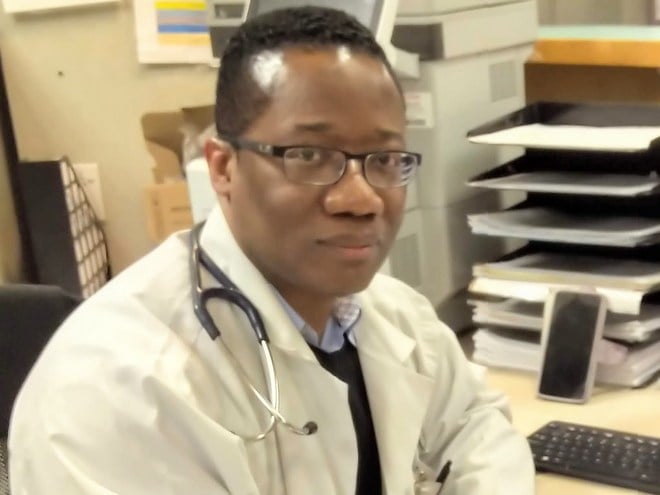Abraham Ballah, MS'08, RN, AGPCNP-BC
Dean's Council charter memberEmbracing opportunity, working hard and living well mean giving back
 When Abraham Ballah, MS, RN, AGPCNP-BC, was pursuing his master's degree at the Graduate School of Nursing, one of his most transformational experiences was one that he initially had misgivings about. But through this challenging experience, he learned to independently manage the care of his patients and transitioned from feeling like a student to feeling like a nurse practitioner.
When Abraham Ballah, MS, RN, AGPCNP-BC, was pursuing his master's degree at the Graduate School of Nursing, one of his most transformational experiences was one that he initially had misgivings about. But through this challenging experience, he learned to independently manage the care of his patients and transitioned from feeling like a student to feeling like a nurse practitioner.
Experiences such as this are among the reasons Ballah chooses to give back to the GSN.
“The GSN program was highly beneficial to me,” he said. “I live a very good life and I enjoy what I do, so I don’t think twice about making a contribution. I just do it.”
Ballah, a 2008 graduate and a longtime annual donor to UMass Chan, has been working as a nurse practitioner with UMass Memorial Medical Group for more than 10 years. There, he is part of the team caring for patients in the group’s four nursing facilities and one rest home.
“It’s a very good job,” he said. “It can be demanding, but that’s okay.”
Doing difficult things, being dedicated to your vocation and making a difference for others are all behaviors that Ballah witnessed at home.
“My father always worked hard,” he said. “I learned from him that to be successful in whatever you decide to do, you need to put in the effort.
“There’s no such thing as an overnight success,” Ballah continued. “It can take years to develop your skills. I didn’t become good at what I do right after I graduated; it took me a long time to do that. It also helps to enjoy what you do.”
Seeing challenges as opportunities—and embracing those opportunities—has also been a driver in his professional development. Ballah’s career aspirations were set in high school, when he worked as a lab assistant in the Island Clinic in his native Liberia. Exposure to the world of science led him toward undergraduate work in biology at Seattle Pacific University in Washington, where he lived for eight years before moving to Massachusetts in 1995.
While pursuing his undergraduate degree, he needed additional income and took a job as a nursing assistant, a position that ultimately set him on his career path.
“After a year in that job, I realized that nursing was what I wanted to pursue,” he said. “So, I got training to become an LPN while living in Seattle.”
After moving across the country and working in a Worcester-based rehabilitation and health care center, Ballah decided he wanted to become an RN. Right away he was drawn to the field of nursing home care and wanted to learn more about it. Characteristically, and with the encouragement of a preceptor, he started taking courses—this time at the GSN—to explore the specialty, which led him to the next phase of his career.
“I liked those courses and the teachers very much, so I knew right away that UMass Chan was where I wanted to be for graduate school,” Ballah recalled.
Like many GSN students, he pursued his master’s degree while working, an endeavor he found challenging and worthwhile for the experiences it provided him.
One experience in particular made another significant impact on his career trajectory: a clinical rotation in correctional health. It was a rotation that ended up being one of the most influential and rewarding components of his GSN education, yet it didn’t begin that way.
“Initially, correctional health wasn’t where I wanted to go,” said Ballah. “But it turned out it was where I needed to go. I learned so much in that health care setting, despite my initial misgivings about working there.
“I had my own set of patients and an office,” he continued. “I didn’t feel like a student. Instead, I felt like staff. It was a great feeling, and it helped me to be more independent during my training. It was a transformational experience—one of the best in my career.”
Like correctional health, long-term care and skilled nursing facilities manage chronic disease, so the expertise that Ballah uses in his profession every day draws directly on what he learned during his correctional health rotation.
“Chronic disease management is a major focus in the correctional health setting,” said Ballah. “So, the skills and knowledge I acquired during my rotation became the most important things I learned and carried on into my career.”
The latest challenges that Ballah is addressing are brought about by notable changes in the patient demographic of today’s skilled nursing facilities.
“The opioid crisis has changed nursing homes,” he said. “Many of the patients now are much younger, and some of them can be very aggressive. My time at the GSN most certainly prepared me for these challenges.”
Overall, Ballah—who has been a steadfast donor to UMass Chan since 2008—feels fortunate for the many opportunities he has had in his life, and he puts his GSN education at the top of the list.
“When you say you’re a graduate of the UMass Chan Tan Chingfen Graduate School of Nursing, people automatically know you are among the very best,” he said. “I hope that current and future students work hard and make the institution proud. When we promote clinical excellence and when we support the school that educated us, we ensure that the GSN remains among the top.”

